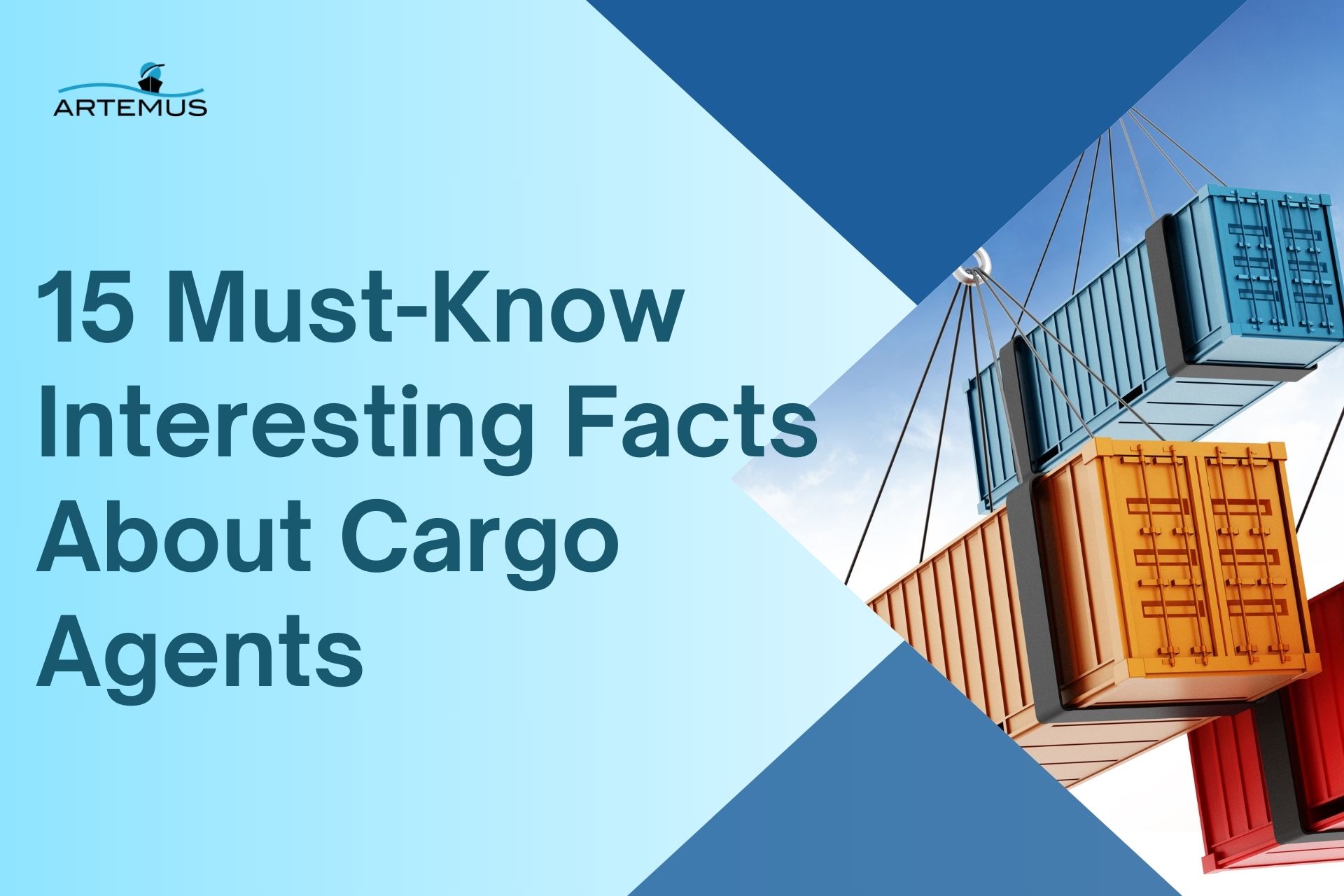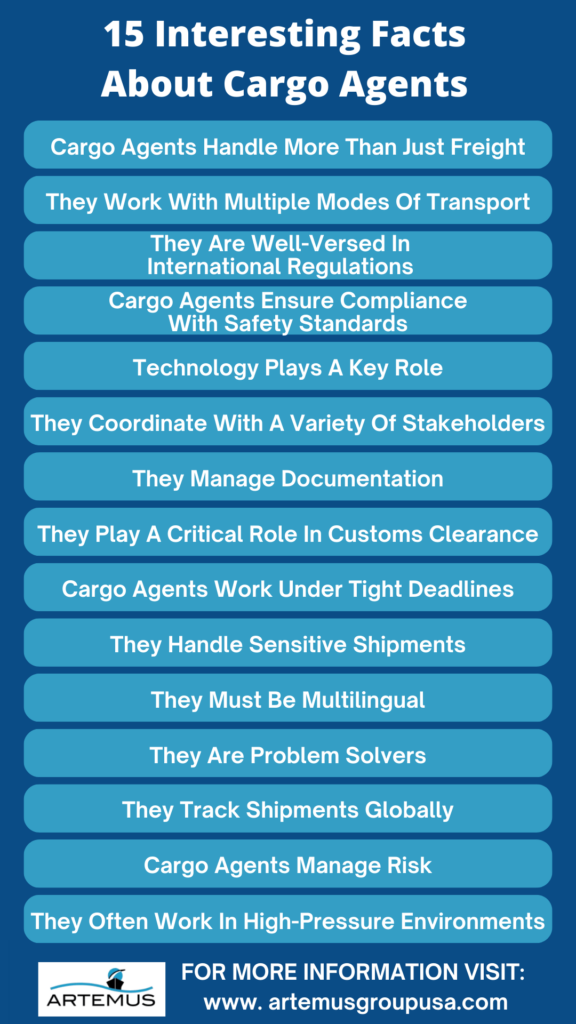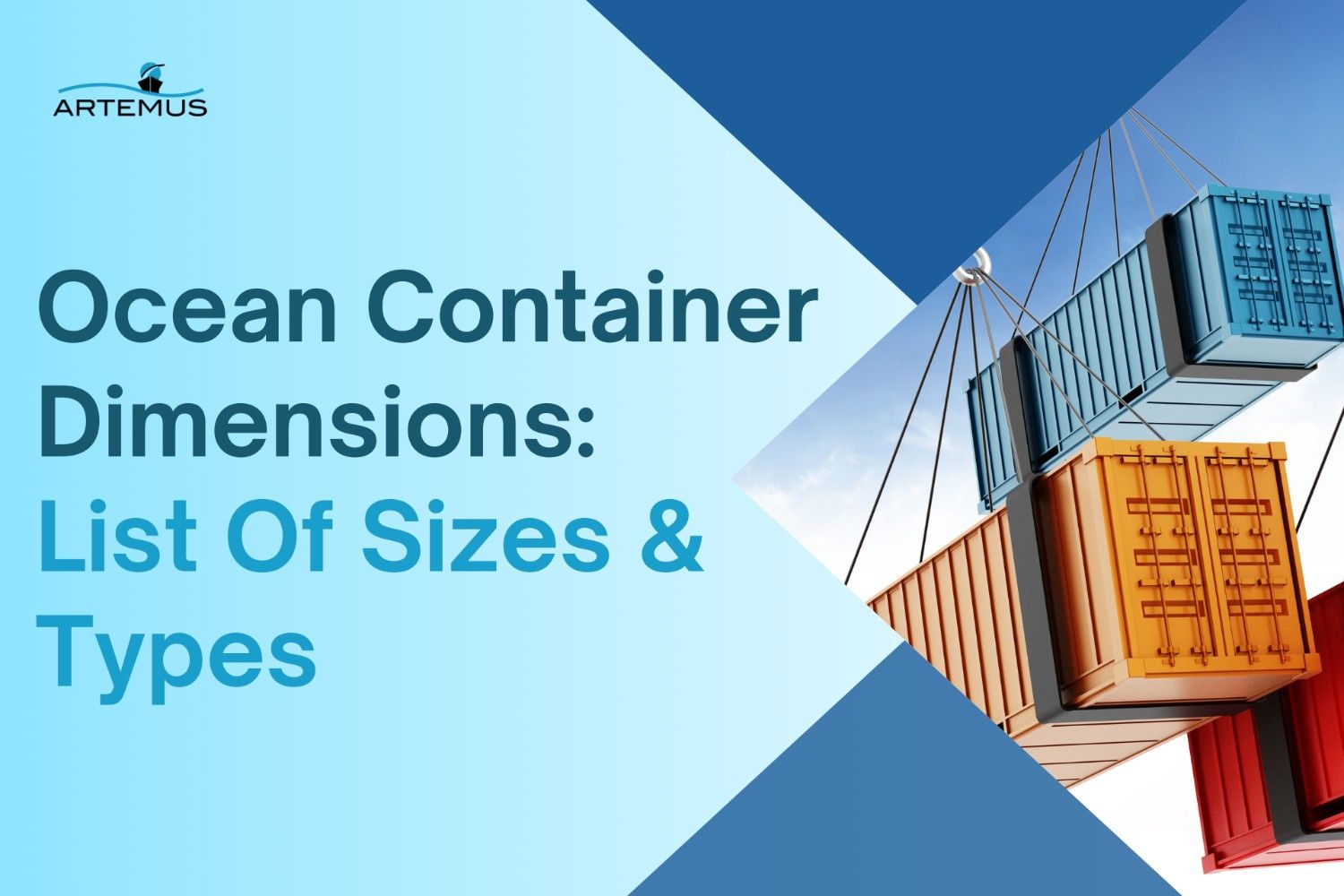
How To Import Goods For Resale In The USA? A 2025 Guide
Importing goods for resale in the USA presents a lucrative business opportunity, but navigating the complexities of U.S. customs regulations,

Cargo agents are the backbone of the global logistics and shipping industries, managing the complex web of tasks that ensure goods are transported efficiently and safely across the world.
From coordinating shipments and ensuring compliance with regulatory standards to handling critical documentation, cargo agents play an indispensable role in keeping global trade moving smoothly. While their work might often go unnoticed, their contributions are vital to maintaining the flow of goods from manufacturers to consumers.
One crucial aspect of cargo agents’ responsibilities is ensuring compliance with regulations set by bodies like the U.S. Customs and Border Protection (CBP). This is where Artemus’ solutions come into play!
Artemus offers a comprehensive platform that streamlines the filing and management of Importer Security Filing (ISF), Automated Manifest System (AMS), and Automated Export System (AES) submissions, ensuring that cargo agents and businesses comply with all necessary U.S. regulations.
Table Of Contents
A cargo agent is a professional responsible for managing the logistics and transportation of goods, ensuring that shipments reach their destination efficiently and on time. They act as intermediaries between various parties involved in the shipping process, including shippers, transport companies, customs authorities, and freight forwarders.
Cargo agents play a crucial role in the smooth functioning of global trade by ensuring that goods are shipped securely, comply with regulations, and are delivered without delays.
Cargo agents are found in multiple industries, including air, sea, and land transport, and their responsibilities vary depending on the mode of transportation and the nature of the cargo. Their job requires a deep understanding of the logistics sector, international trade regulations, and the needs of different types of cargo.
Cargo agents are responsible for various tasks that ensure the successful transportation of goods. Some of their key duties include:
Related: What Is Ocean Freight Forwarding & Its Process?

Cargo agents play a pivotal role in the global logistics and transportation industry, acting as intermediaries who help manage the smooth flow of goods across borders, through airports, seaports, and inland routes.
While their work may not always be visible, it is essential to the efficient movement of goods that powers trade and commerce worldwide. Here are 15 interesting facts about cargo agents that highlight the depth of their responsibilities and their crucial role in the logistics chain.
While the term “cargo” often conjures images of heavy machinery or containers, cargo agents are responsible for handling a wide range of goods. This includes everything from raw materials like oil and gas to delicate items like electronics, pharmaceuticals, and perishables. Cargo agents must understand the specific requirements for shipping various goods, including temperature controls, packaging, and documentation.
Cargo agents are not limited to one mode of transportation. They are adept at managing logistics for goods that move by air, sea, rail, or road. For instance, cargo agents coordinating international shipments might oversee the goods’ transition from a cargo plane to a shipping container, all while ensuring that each step complies with regulations and is completed on time.
Navigating the maze of international shipping regulations is one of the key duties of a cargo agent. They must be well-versed in the regulations set by various governing bodies, such as the International Air Transport Association (IATA), the International Maritime Organization (IMO), and customs authorities in different countries. Understanding these laws ensures that goods are transported legally and efficiently.
Safety is paramount in logistics, and cargo agents are responsible for ensuring that shipments adhere to stringent safety standards. This includes securing cargo to prevent it from shifting during transport, ensuring that hazardous materials are safely handled, and making sure that dangerous goods are properly labeled and transported in compliance with international laws like the UN’s Recommendations on the Transport of Dangerous Goods.
Modern cargo agents rely heavily on technology to track and manage shipments. They use sophisticated cargo management systems that provide real-time updates on the location and status of goods. Technology helps cargo agents streamline operations, manage inventory, and reduce the chances of errors in scheduling and documentation.
Cargo agents act as the central point of contact between various stakeholders in the shipping process. This includes collaborating with shippers, trucking companies, port authorities, customs brokers, airlines, and shipping lines. Effective communication and negotiation are crucial skills for cargo agents, as they need to align all parties to ensure that goods are shipped smoothly and on time.
Cargo agents are responsible for handling a significant amount of documentation for each shipment. This includes creating bills of lading, customs declarations, and shipping invoices. Accurate paperwork is crucial to avoid delays and ensure that shipments can clear customs quickly. They must also be adept at understanding the intricacies of international trade documents.
One of the most time-sensitive tasks cargo agents handle is ensuring that goods clear customs smoothly. Cargo agents must coordinate with customs authorities to ensure that all necessary documentation is in place, taxes and duties are paid, and any inspections are completed. Any issues at this stage can cause significant delays, impacting the entire supply chain.
Time is often of the essence in the cargo industry. Cargo agents typically work under tight deadlines to ensure that shipments are delivered on schedule. Delays in one part of the supply chain can cause a domino effect, delaying the entire shipment. Cargo agents are responsible for preventing this by coordinating each stage of the transport process meticulously.
Cargo agents frequently deal with sensitive shipments, such as medical supplies, high-value items, or perishables. For these types of goods, specific regulations, packaging methods, and transport conditions need to be met. Cargo agents must be trained to handle such shipments with the utmost care and attention to detail to ensure that the goods arrive in good condition.
Given the international nature of their work, cargo agents often communicate with clients, customs officials, and suppliers from around the world. Multilingual skills are a huge advantage in this role, as they help cargo agents navigate language barriers, understand local customs regulations, and provide better customer service. English remains the most commonly used language in logistics, but knowledge of additional languages is invaluable.
Cargo agents often face unforeseen challenges that require quick thinking and problem-solving skills. This could include dealing with unexpected delays, damaged cargo, or customs issues. The ability to adapt and find solutions under pressure is an essential trait for successful cargo agents. They are trained to remain calm in stressful situations and resolve issues swiftly to keep the supply chain moving.
In today’s global economy, cargo agents track shipments across the world. With international shipments, there may be several stages involving multiple countries, and cargo agents need to ensure that all stages are monitored for any potential issues. This includes staying updated with real-time tracking and overseeing logistics networks to make sure that the cargo reaches its final destination without complications.
Cargo agents must understand and manage the risks associated with shipping goods internationally. These risks include natural disasters, accidents, theft, or damage to the cargo. Cargo agents work closely with insurance providers to ensure that goods are covered during transport and that any damage or loss is compensated. Managing these risks is a critical aspect of their job.
Cargo agents typically work in fast-paced, high-pressure environments. With deadlines to meet, shipments to track, and regulatory requirements to follow, the role can be stressful. However, this is also one of the aspects that makes the job both exciting and rewarding. Cargo agents must be organized, detail-oriented, and able to think quickly to succeed in this fast-paced industry.
Related: How To Become A Freight Forwarder: A Stepwise Guide
Artemus offers a comprehensive software solution for managing ISF (Importer Security Filing), AMS (Automated Manifest System), and AES (Automated Export System) filings, ensuring compliance with U.S. Customs and Border Protection (CBP) regulations.
Designed for customs brokers, freight forwarders, and importers, Artemus streamlines the filing process, reducing the risk of errors and penalties. With real-time tracking, automated updates, and seamless integration with CBP systems, Artemus simplifies the complexities of regulatory compliance, helping businesses maintain smooth operations and avoid costly delays.
A cargo agent manages the logistics of transporting goods, ensuring compliance with regulations, handling documentation, and coordinating shipments across various modes of transport. They act as intermediaries between shippers, transport companies, and customs authorities.
The shipping industry accounts for around 90% of global trade, with more than 50,000 cargo ships operating worldwide. It’s also one of the most carbon-efficient modes of transportation for bulk goods.
Air freight is the fastest mode of transportation, moving goods at speeds of up to 600 miles per hour. It also accounts for a smaller share of global trade by volume but a larger portion by value, especially for high-value or time-sensitive items.
Cargo handling ensures that goods are safely loaded, unloaded, and transported, minimizing the risk of damage or loss. Proper handling is crucial for maintaining the integrity of cargo, especially for delicate or hazardous materials.
Cargo is the backbone of global trade, enabling the movement of goods between countries and continents. It supports economies by ensuring that raw materials, finished products, and essential supplies reach their destinations efficiently.
The primary objectives of a cargo handler are to ensure safe, timely, and efficient loading, unloading, and transportation of goods. They must also comply with safety regulations and handle all cargo types with care.
Cargo ships are some of the largest vehicles in the world, with the largest ships capable of carrying over 23,000 containers. They travel millions of miles across oceans and can stay at sea for months without docking.
Logistics involves the movement of over 150 trillion dollars in goods annually. It’s a multi-faceted industry that includes inventory management, transportation, warehousing, and supply chain optimization.
Cargo agents are vital players in the intricate world of logistics and international trade. Their ability to navigate complex regulations, manage diverse cargo types, and coordinate shipments across different transportation modes is essential for the smooth flow of goods worldwide.
By ensuring compliance, safeguarding shipments, and facilitating the timely delivery of goods, cargo agents help businesses maintain operational efficiency and avoid costly delays.
Related: Customs Broker VS Freight Forwarder: 5 Key Differences

Importing goods for resale in the USA presents a lucrative business opportunity, but navigating the complexities of U.S. customs regulations,

Cargo agents are the backbone of the global logistics and shipping industries, managing the complex web of tasks that ensure

Ocean container dimensions are essential for efficient global shipping, ensuring that goods are transported safely and cost-effectively. Understanding container sizes,
Get In Touch
Artemus’ Software Solutions for ISF, AMS, Japan AFR, eManifest Canada, & Panama B2B filings.